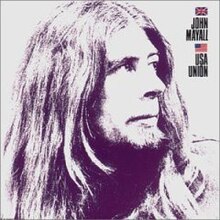
John Mayall, OBE is an English blues singer, guitarist, organist and songwriter, whose musical career spans over sixty years. In the 1960s, he was the founder of John Mayall & the Bluesbreakers, a band which has counted among its members some of the most famous blues and blues rock musicians.

Canned Heat is an American blues and rock band that was formed in Los Angeles in 1965. The group has been noted for its efforts to promote interest in blues music and its original artists. It was launched by two blues enthusiasts Alan Wilson and Bob Hite, who took the name from Tommy Johnson's 1928 "Canned Heat Blues", a song about an alcoholic who had desperately turned to drinking Sterno, generically called "canned heat", from the original 1914 product name Sterno Canned Heat, After appearances at the Monterey and Woodstock festivals at the end of the 1960s, the band acquired worldwide fame with a lineup consisting of Hite (vocals), Wilson, Henry Vestine and later Harvey Mandel, Larry Taylor (bass), and Adolfo de la Parra (drums).
Don Francis Bowman "Sugarcane" Harris was an American rock and roll violinist and guitarist. He is considered a pioneer in the amplification of the violin.
Don and Dewey were an American rock, blues and R&B duo, comprising Don "Sugarcane" Harris and Dewey Terry. Both were born and grew up in Pasadena, California.
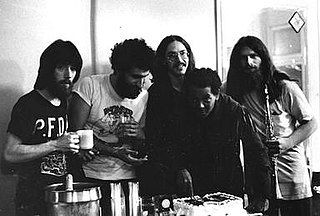
Pure Food and Drug Act (listed in The All Music Guide to the Blues, the Guinness Encyclopedia of Popular Music ) was a band that was formed in the early 1970s by Don "Sugarcane" Harris. The band began with Paul Lagos on drums, Larry Taylor on bass and Randy Resnick on guitar. Resnick was at that time experimenting with a one and two handed tapping technique which later became a standard guitarist's tool. The group played small rooms in the Los Angeles area, such as the Troubadour and the Ash Grove, for several months.

Future Blues is the fifth album by American rock band Canned Heat, released in 1970. It was the last to feature the band's classic lineup, as Larry Taylor and Harvey Mandel had both departed by July 1970, prior to its release to record with John Mayall and songwriter Alan Wilson died shortly after on September 3, 1970. It was also the only classic-era Canned Heat studio album to feature Mandel, as Henry Vestine had been the lead guitarist on the previous albums. Their cover of "Let's Work Together" by Wilbert Harrison became a hit. "London Blues" features Dr. John. It was re-released on CD in 2002 by MAM productions with five bonus tracks.

Randy Resnick is an American guitarist and saxophonist who has played with many prominent blues and jazz musicians, such as Don "Sugarcane" Harris, John Lee Hooker, John Mayall and Freddie King. He was developing both one- and two-handed tapping style in the early 1970s. He published a CD of his own music in 1995, "To Love" under the name Randy Rare. There is an example of his tapping work in the recording from that CD below.
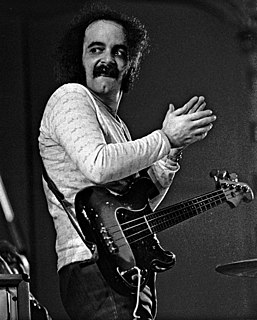
Samuel Lawrence Taylor was an American bass guitarist, best known for his work as a member of Canned Heat from 1967. Before joining Canned Heat he had been a session bassist for The Monkees and Jerry Lee Lewis. He was the younger brother of Mel Taylor, long-time drummer of The Ventures.

The Turning Point is a live album by John Mayall, featuring British blues music recorded at a concert at Bill Graham's Fillmore East on 12 July 1969.
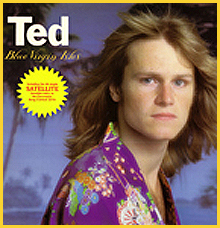
Blue Virgin Isles is the fifth studio album and international debut album by Swedish singer-songwriter Ted Gärdestad, released on November 1978 by Epic Records in the UK and Polar Music in Scandinavia.
Live from Austin, TX is a live album by John Mayall and the Bluesbreakers. The performance from September 13, 1993 was for the TV show Austin City Limits and has been released in 2007 on CD and DVD. Only John Mayall is credited on the cover but he can be heard to announce 'The Bluesbreakers': Joe Yuele on drums, Rick Cortes on bass and Coco Montoya on lead guitar. Texas guitarist David Grissom makes a guest appearance on last track.
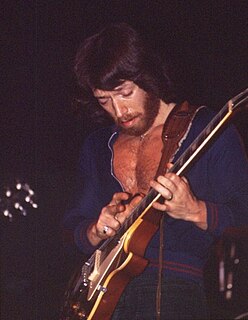
Harvey Mandel is an American guitarist known for his innovative approach to electric guitar playing. A professional at twenty, he played with Charlie Musselwhite, Canned Heat, the Rolling Stones, and John Mayall as well as maintaining a solo career. Mandel is one of the first rock guitarists to use two-handed fretboard tapping.

Back to the Roots is a 1971 double album by John Mayall released on Polydor. Recording sessions took place both in California and London where Mayall invited some former members of his band, notably guitarists Eric Clapton and Mick Taylor. At the end of the 1980s Mayall remixed some tracks and issued them along with some of the older material as Archives to Eighties. An expanded two-CD version of Back to the Roots now includes both the original and later remixed versions of the tracks.

Ten Years Are Gone is a double album by John Mayall, recorded at Sunset Sound, Los Angeles, and released in 1973. Like its predecessors Jazz Blues Fusion and Moving On, it features Freddy Robinson on guitar and Blue Mitchell on trumpet.

Sonny & Brownie is an album by the blues musicians Sonny Terry and Brownie McGhee. It was recorded at the Paramount Recording Studios in 1973, and re-released in 1988 with digital remastering by Rudy Van Gelder at the Van Gelder Recording Studio.
Music from Free Creek is an album from a series of 1969 "super session" recordings by Free Creek, a group composed of a number of internationally renowned musical artists of the time, including Jeff Beck, Eric Clapton, Keith Emerson, Buzz Feiten, Mitch Mitchell and Linda Ronstadt. Joe Viglione from www.allmusic.com has stated that "Music from Free Creek is a super session album, where the musicians are playing for the fun of it, and that comes across. The material doesn't get bogged down in 'names'; it just flows."

Empty Rooms is a studio album by English blues musician John Mayall, released in March 1970 on Polydor. It is a follow-up to the live album The Turning Point, released earlier in the year with the same musicians: Jon Mark on acoustic guitar, Johnny Almond on saxophones and flute, and Stephen Thompson on bass. John Mayall sings, plays harmonica, guitars and keyboards. Former Canned Heat bassist Larry Taylor guests as second bass player on one track, "To a Princess," improvising with Thompson on an unusual bass duet. The absence of a drummer leaves the rhythm rather fluid and the resulting sound is unusual, even for a John Mayall album. The songs, all written by Mayall, mostly addressed his romance with photographer Nancy Throckmorton, a theme he would pursue further on USA Union. The album is dedicated to her.
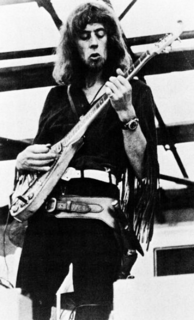
The discography of English blues rock musician John Mayall, including the band John Mayall & the Bluesbreakers, consists of 35 studio albums, 34 live albums, 24 compilation albums, four extended plays (EPs), 44 singles and four video albums. Mayall's 36th studio album was released in 2019.

Cristo Redentor is the debut album by Harvey Mandel. Richie Unterberger of AllMusic writes that "Mandel's debut remains his best early work." John Tobler wrote in the liner notes of the CD that Mandel "was good enough to be invited to audition for The Rolling Stones and he worked with John Mayall and Canned Heat - but it is for this Cristo Redentor album, and particularly for the utterly classic Wade in the Water that he will be remembered." This album is completely instrumental with the exception of the title track where soprano Jacqueline May Allen, joined by Carolyn Willis, Edna Wright and Julia Tillman, blend their wordless voices as if another instrument.
